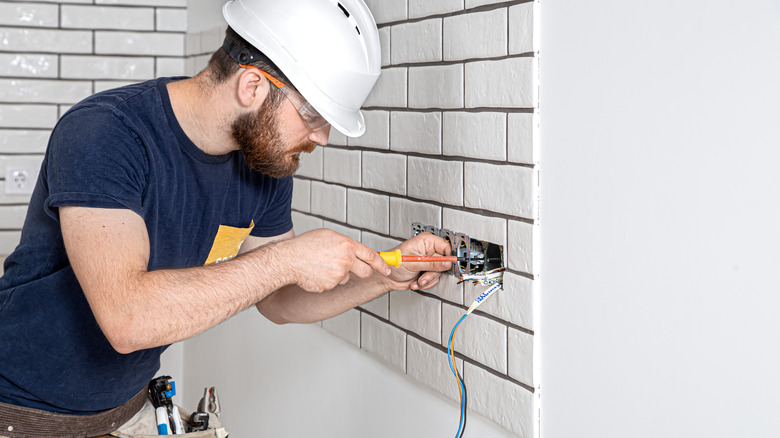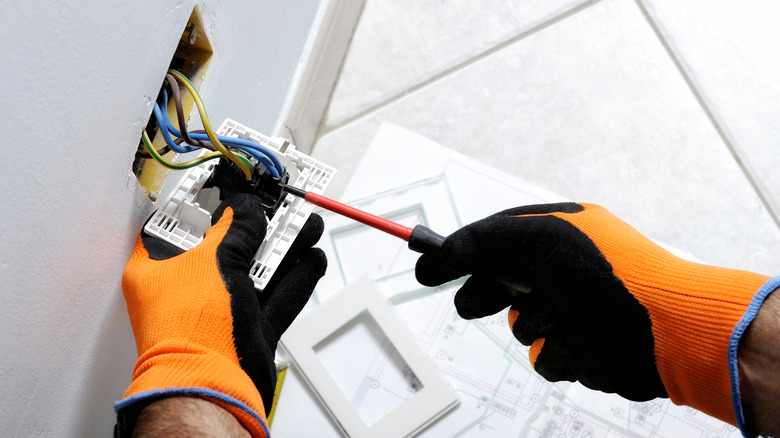The Biggest Scams To Watch For With Electricians
While there are plenty of trustworthy electricians, there are just as many technicians who have no problem inflating their prices or exaggerating the work needed to be done in order to pad the invoice, according to Angi. In order to protect you during your next electrical problem, we rounded up some of the biggest scams to watch for with electricians. Just like with mechanics or contractors, an unsavory electrician will gauge their client's electric know-how and then proceed to rip them off if it seems like the client knows little about the work needed to be done. They might claim that an overused extension cord caused a short circuit, shoddy wiring is causing you to get a high electric bill, or your efforts at becoming energy efficient backfired and now there is an unforeseen problem that will make the job cost triple the original quote.
If you don't know much about electrical work and feel overwhelmed with what needs to be done, then your first gut instinct might be to agree with what the technician recommends. But if you know some of the most common electrician scams, then you can protect yourself from some obvious red flags and only employ the most trustworthy of technicians. Ahead are some of these red flags.
Be wary if an electrician demands an upfront payment
While it's standard for licensed technicians to secure a deposit, it is not common to have a technician ask for a full payment. Lightning Bug Electric, an expert electrician company in Georgia, says that you should expect a licensed electrician to ask for a small deposit or supply fee, but no more than that. There needs to be trust on both ends of the partnership, and paying in installments ensures that both the customer will pay the technician for their work, and that the technician will continue to come back to finish the job. If an electrician demands an upfront, in-full payment prior to starting the job, then that might be a scam.
While an upfront payment might not necessarily guarantee you're being scammed, it could indicate that you're not hiring a quality electrician. Frank from Franky's Electric, a licensed electrician with over 25 years experience, compared the situation to eating at a fast food joint verses a quality restaurant. At the fast food chain you pay up front and eat a questionable burger. But at a quality restaurant, you enjoy an expertly prepared meal and pay after the dishes are taken away. Electricians who ask for payment at the end of the job know that their work guarantees the payment.
Be concerned if an electrician wants to completely rewire your house
No one wants to mess around with the possibility of an electrical fire, so that is why some shady electricians will pull the "complete rewire" scam. Much like how a mechanic will offer to take a free peek under your hood after an oil change, an electrician might offer to inspect the wiring of your house. If they come back to you with a quote for a full rewire, don't jump on the offer. According to Angi, if the electrician says that your wiring doesn't meet code, is a safety risk, or needs to be updated this very second, you might be in the middle of a scam. The electrician is hoping you make a rash decision out of panic, which will allow them to gauge you in the price.
Instead, tell the electrician you want to get a second opinion before buying any services. On the off chance that the first electrician was sincere and your wiring does need to be updated, enlisting a second opinion will also provide you a competitive second quote.
If an electrician constantly change the prices, it might be a scam
Be wary of an electrician who offers you a surprisingly low quote for a project. While at first it might seem like you're getting the deal of a lifetime, a below-average quote can indicate skyrocketing prices in your horizons. Some electricians will underbid a project only to increase the price tenfold as the project progresses.
While it is true that unexpected things can happen during a project that would require a price adjustment, be wary of an electrician who brings you multiple price adjustments along the course of the job. In order to avoid this, Kevin Brasler, an executive editor at Consumers' Checkbook, a website that reviews local services, recommends requesting an average hourly rate. This will show the electrician you're keeping tabs on the invoice, and it will help you determine whether the numbers are inflated or warranted. "It's best to get a fixed price for any work they're doing, but, at least if you know what the hourly labor rate is, you'll know whether they're really expensive or not," Brasler told WTOP News.
Be advised if your electrician uses confusing jargon
Alarm bells should immediately go off for you if you work with a technician who uses confusing jargon when explaining their recommendations. Technicians who talk quickly and use overly confusing language might be trying to overwhelm you in order to get you to agree to inflated prices and unnecessary work. APower Electrical Service, a Denver-based electric service company, warns against electricians who offer verbal project analysis instead of written estimates for just this reason. It can indicate that they're trying to put you on the spot and force a rushed decision out of you. A trustworthy technician will allow you the time and space to research their analysis and make an informed decision.
APower Electrical Service recommends asking for a written document detailing the recommended work and price breakdown instead. They also recommend asking questions, since a reputable electrician will be happy to explain the work that is needed.
It might be a scam if an electrician makes a minor issue sound urgent
Some unsavory technicians like to take advantage of people's limited understanding of electrical work. Just like how a mechanic might take advantage of a person who seems uneducated about cars, an electrician can do the same. They can take a minor issue and blow it out of proportion to make it sound urgent and complicated, which will then allow them to charge a high invoice, according to Keep Asking.
If an electrical issue sounds minor, or if you're not really sure of the problem's urgency level, tell the electrician you want time to research it. This will help protect you from getting gauged with the bill. It would also be helpful to brush up on your electrical issue prior to the technician's arrival; that way you will be armed with a basic understanding of the problem, and can catch any scam attempts.
While there are many trustworthy electricians out there, you still want to protect yourself from the few technicians who want to take advantage of a client. Keep these electrician scams in the back of your mind, and look out for any red flags. You got this!





